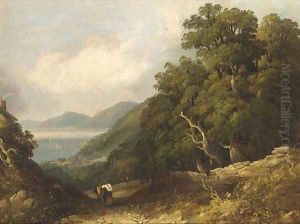Joseph W. Allen Paintings
Joseph W. Allen was an English landscape and marine painter, born in 1820. His work reflects the Victorian era's fascination with the natural world and the British Empire's maritime prowess. Despite the lack of extensive documentation on his life, Allen's paintings have contributed to our understanding of 19th-century British art, particularly in the context of landscape and marine subjects.
Allen's career spanned a period of significant change in the art world, including the rise of the Pre-Raphaelite Brotherhood and the early influences of Impressionism. However, he remained largely traditional in his technique and subject matter, focusing on the beauty of the English countryside and its coastal areas. His work is characterized by meticulous attention to detail, vibrant colors, and a deep appreciation for the interplay of light and shadow, often capturing the serene beauty of rural England and the majestic power of the sea.
While Allen did not achieve the same level of fame as some of his contemporaries, his paintings were well-regarded during his lifetime. He exhibited at various prestigious venues, including the Royal Academy of Arts, though his presence in modern art historical scholarship is somewhat limited. This relative obscurity may be attributed to the changing tastes of the art world and the overshadowing prominence of other artists of his time.
Joseph W. Allen passed away in 1903, leaving behind a legacy encapsulated in his contributions to the British landscape and marine painting tradition. Today, his works are held in both private collections and public institutions, appreciated for their technical skill and evocative portrayal of the 19th-century British landscape. Allen's art continues to attract interest from collectors and historians, offering a window into the Victorian era's artistic endeavors and its relationship with the natural world.
